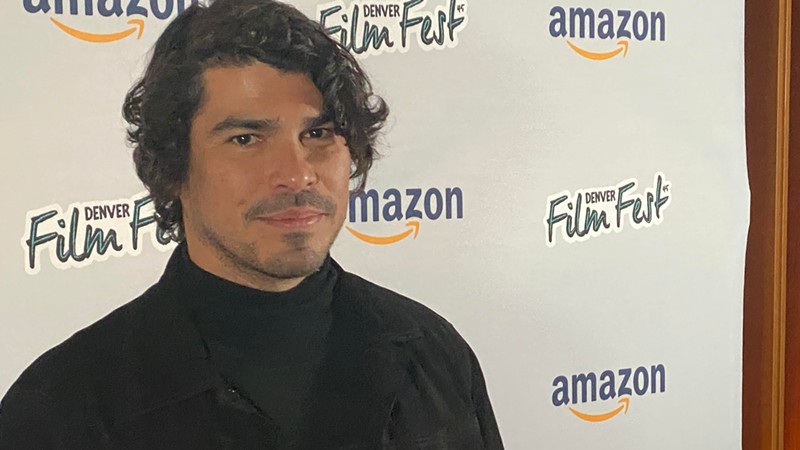To get a sense of the 2022 edition, here's a look at my DFF45 diary:

Three How to Blow Up a Pipeline creators (from left): producer Isa Mazzei, writer/producer Jordal Sjol and director Daniel Goldhaber.
Photo by Michael Roberts
Empire of Light, Friday, November 4, at the Ellie Caulkins Opera House, is being promoted as a valentine to movie palaces of the past, but don't go into it expecting Cinema Paradiso. The latest from director/writer Sam Mendes is essentially the British twin of Armageddon Time, since both films are set in 1980 and revolve around race relations. Olivia Colman, who acts as if the obvious effort she's exerting should earn her another Academy Award nomination (she's probably right, since Oscar voters seldom reward subtlety), plays Hilary, a lonely, unhappy woman struggling with mental health issues who meets Michael Ward's Stephen, a Black fan of the two-tone ska movement who's targeted by skinheads and National Front thugs. The couple's tender but not wholly believable relationship forms the spine of the story, which seems so tangential to the theater around which the action revolves that my son, who accompanied me, saw the entire enterprise as something of a bait-and-switch — and he's got a point.
Butterfly in the Sky, Saturday, November 5, at the AMC 9 + CO 10, is proof that sincerity and a good subject can take filmmakers a long way. The documentary traces the history of Reading Rainbow, a PBS educational program that starred LeVar Burton, fresh from his television debut in the slavery epic Roots. There's nothing particularly revolutionary about the way directors Bradford Thomason and Brett Whitcomb present the material; they lean heavily on interviews and clips. But the snippets, including a song in which the members of Run-D.M.C. rap about how much they love books, are charming, and everyone involved, including Burton, so obviously had their hearts in the right place that those watching can't help but feel the love.
The Grab, Saturday, November 5, at the AMC 9 + CO 10, is a documentary that takes on a much heavier topic: how food and water are replacing fossil fuels as the motivator behind many global conflicts. The focus is on a nearly decade-long probe conducted by Nate Halverson on behalf of the Center for Investigative Reporting, with director Gabriela Cowperthwaite using him as a common thread to weave together examples of the phenomenon in the United States, Africa and war-torn Ukraine. The film presents scads of convincing information — too much, in fact. Rather than narrowing their focus, Cowperthwaite and Halverson, who were present for the screening, keep broadening it to the point where the the doc becomes something of a data dump. Viewers will learn a lot, but only if they're willing to laboriously sift through the results rather than simply absorbing them.

(From left) Battleground director Cynthia Lowen and The Grab producer and subject Nate Halverson with the documentary's director, Gabriela Cowperthwaite.
Photos by Michael Roberts
The Lost King, Sunday, November 6, at the Sie FilmCenter, is the latest entry in an idiosyncratic subgenre of British film that explores a lovably awkward true-life eccentric's magnificently odd obsession. (The Duke, a 2020 film about a man who stole the Duke of Wellington's portrait in part to protest having to pay for a TV license, is a recent example.) The protagonist is Philippa Langley, who waged an ultimately successful campaign to unearth the corpse of King Richard III in large part because she felt Shakespeare's depiction of him as a cruelly disfigured tyrant was unfair. The plot, assembled by Steve Coogan, who co-stars, is rather slight and uses the dopey gimmick of having Richard's apparition regularly appear before Philippa. Still, the wobbly contraption holds together surprisingly well, thanks largely to star Sally Hawkins and director Stephen Frears, both of whom tend to be forgotten when lists of current cinematic treasures are assembled, even though they absolutely deserve to be included. Quirky and lovely in equal measure.
The Son, Sunday, November 6, at the Sie FilmCenter, could not be more different, or less laudable. The title character is Nicholas (Zen McGrath), and from early on, he makes it plain that he's going through a terrible mental health crisis that his divorced parents, played by Laura Dern and Hugh Jackman, fail to address in even close to an effective way. Instead, they either dither or offer shallow encouragement or empty gestures as the teen careens ever closer to the metaphorical cliff. The slow march toward the inevitable plays out by way of intermittent outbursts briefly interrupted by a cameo from Armageddon Time star Anthony Hopkins, who won an Oscar for The Father under the supervision of director Florian Zeller. Neither Jackman nor Dern are likely to follow suit owing to the lackluster material, Zeller's utter lack of visual flair and stereotypical dourness epitomized by the moment when "It's Not Unusual," a Tom Jones song used to score a dance scene, is faded out in favor of the most depressing ballad the creators could find.
She Said, Monday, November 7, at the Denver Botanic Gardens, which details the New York Times inquiry into accusations of sexual crimes against Miramax boss Harvey Weinstein, could have been just as much of a slog. But against all odds, the film version of a book by scribes Megan Twohey (Cary Mulligan) and Jodi Kantor (Zoe Kazan) is a model of smart Hollywood adaptation. Rather than channeling Lifetime and hiring an actor to reenact scenes of abuse, director Maria Schrader and screenwriter Rebecca Lenkiewicz smartly take the All the President's Men approach of following Twohey and Kantor as they try to get enough evidence on the record to make Weinstein pay for his horrendous crimes. Granted, there's more hugging in the newsroom than most reporters see in a career, and the Times's tremendous resources (the paper pays to fly Kantor to London simply to knock on the door of a potential source who hasn't been answering calls or emails) are taken for granted. But the revelations more than earn this particular love letter to journalism, and the performances are uniformly first-rate — especially the one delivered by Andre Braugher as Times executive editor Dean Baquet, who should send Braugher a thank-you note immediately.
Living, Tuesday, November 8, at the Denver Botanic Gardens, is a ’50s-set British variation on Akira Kurosawa's Ikiru, a 1952 film drawn from Leo Tolstoy's 1886 novella The Death of Ivan Ilyich — which means there's not a lot of suspense about whether Williams, a civil servant portrayed by Bill Nighy, is going to wind up in a coffin. But the bitter comes with plenty of sweet. After receiving a terminal diagnosis, Williams considers shaking off his bourgeois malaise and going wild, but he soon comes up with a far more apt way to leave his mark — helping to cut through reams of red tape and bureaucracy in order to create a park in the middle of London's crumbling inner city. The tone set by director Oliver Hermanus is so low-key that it's only a step or two removed from silence; Nighy delivers most of his dialogue in a quiet murmur, and with the exception of Aimee Lou Wood's turn as an upbeat former co-worker, most of his castmates seem to know that raised voices are against the rules. But if there's a certain sleepiness about the project, Living's conclusion offers the happiest sort of sad ending.
The Inspection, Wednesday, November 9, at the Denver Botanic Gardens, co-stars Raúl Castillo, recipient of this year's DFF Excellence in Acting Award, and in talks before and after the highly anticipated new flick unspooled, he didn't disappoint. He seemed genuinely pleased by the honor, and if he proved a bit geographically challenged (at one point, he guessed that Snowmass was "north of here"), his description of his winding career path (prior to becoming an actor, he was a fledgling punk-rock musician) was brightened by a sense of wonder and gratitude. But while his work in The Inspection is solid, the film itself proved rather underwhelming. Writer/director Elegance Bratton's semi-autobiographical study of Ellis French (Jeremy Pope), a queer Black man trying to survive Marine boot camp circa 2005, strikes too many stereotypical beats, with several plot twists, including not one but two problematic shower scenes, corresponding more snugly than necessary with hoary gay-panic tropes. Clumsy staging and a resolution built around an energetically de-glamourized Gabrielle Union as Ellis's unsympathetic mom that lands with a thud also do damage, leaving The Inspection feeling less like a fresh look at a familiar milieu than a missed opportunity.

Writer-director Julian Rubinstein and Terrance Roberts, the subject of the film The Holly.
Photos by Michael Roberts
Please Baby Please, Friday, November 11, at the AMC 9 + CO 10, is a minor but lively tribute to early-period David Lynch: a Blue Velvet riff produced with the resources of Eraserhead that's built around characters whose sexuality starts out fluid and ends up a gas. The performances by Andrea Riseborough and Harry Melling, as a couple who begin to break out of their shells after encountering a street gang whose members seem to have wandered in from a particularly rough-trade revival of Grease, are comically arch, as is a cameo by, of all people, Demi Moore. And if too much of director Amanda Kramer's enterprise is secondhand, there's a genuine spark to several quirky musical numbers, including one in which Riseborough cavorts with a series of household appliances. It's capable of inspiring you to ask your vacuum for a dance.

Mark Mothersbaugh autographing a fan's energy dome and talking about his contributions to Pee-wee's Playhouse.
Photos by Michael Roberts

Andy Falconetti of Sissy Fuzz and the Apples in Stereo's Eric Allen at the screening of The Elephant 6 Recording Co..
Photo by Michael Roberts

Sheila McCarthy accepting the Denver Film Festival's career-achievement award prior to the screening of Women Talking.
Photo by Michael Roberts
Turn Every Page: The Adventures of Robert Caro and Robert Gottlieb, Sunday, November 13, at the Sie FilmCenter, documents the half-century-long working relationship between Caro, author of The Power Broker, an influential profile of Robert Moses, and a multi-volume exploration of President Lyndon B. Johnson that stands among the greatest-ever political biographies, and Gottlieb, arguably the most celebrated book editor of the era. At 87, Caro is still trying to complete the final book of his LBJ series, while Gottlieb, 91, is hoping to hang on long enough to add his touch — and director Lizzie Gottlieb (the latter's daughter) presents them as the last of a dying breed. Humor abounds: Caro still uses a typewriter and carbon paper, while Gottlieb insists on editing with a pencil — and discovers near the end of the film how difficult it is to find one in a 21st-century publishing house.
The movie will never be a blockbuster, but those who saw it were clearly glad it exists — and equally pleased that such obscurities are championed by the Denver Film Festival.












